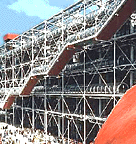|
|
|
|
|
|
|
|
|
|
|
|
|
|
|
|
|
|
|
|
|
|
|
|
|
|
| ||||||||||
| ||||||||||
| ||||||||||
History
The Centre National
d'Art et de Culture Georges Pompidou is a giant, futuristic arts
center located in the Beaubourg {boh-boor'} district of Paris.
President Pompidou conceived (1969) the idea for Beaubourg, as the
center is also known, to bring art and culture to the "man in the
street".  It was completed in 1978 by the
architects Renzo Piano of Italy and Richard Rogers of England, and by
the engineering firm of Ove Arup and Partners of England. The
structure forms a huge transparent box whose exposed frame of tubular
steel columns carries trusses spanning the width of the building.
External mechanical systems -- elevators painted red; escalators in
clear plastic tunnels; and giant tubes for air (painted blue), water
(green), and electricity (yellow) -- all are conspicuously placed
outside the main columns.
It was completed in 1978 by the
architects Renzo Piano of Italy and Richard Rogers of England, and by
the engineering firm of Ove Arup and Partners of England. The
structure forms a huge transparent box whose exposed frame of tubular
steel columns carries trusses spanning the width of the building.
External mechanical systems -- elevators painted red; escalators in
clear plastic tunnels; and giant tubes for air (painted blue), water
(green), and electricity (yellow) -- all are conspicuously placed
outside the main columns.
Considerable controversy arose over the assertive industrial style of the Pompidou Center, whose bold "exo-skeletal" architecture contrasts violently with surrounding houses in the heart of an old section of Paris near the Hôtel de Ville. The Center has been hugely successful, however, with its many art exhibitions and the National Museum of Modern Art, attracting more than 160 million people since its inauguration. The wear and tear resulting from some 26,000 daily visitors -- five times more than intended -- caused most of the facility to be shut down for renovations, to be re-opened at the end of 1999. Meanwhile, the library, Bibliothèque Publique Information, is housed in temporary quarters for the interim. Part of the building will be kept open for temporary exhibitions, and you can still take the escalators to the top floor for a marvelous view of Paris.
The Beaubourg Plaza in front of the Centre remains a very animated area: its jugglers, mimes and humorists from all over Europe continuously attract a crowd. This Paris tradition, which survives from the Middle Ages, can also be spotted in other areas like Saint-Germain-des-Près and the Place de la Contrescarpe (near the Panthéon). The Beaubourg area is especially lively at night, offering visitors plenty of bars and restaurants.
Admission
For those who plan to visit many monuments and museums during their séjour à Paris, the Paris Tourist Office offers a "Museums and Monuments Card", valid for unlimited visits and priority access to 65 locations in - and around - Paris. It may be purchased at the Paris Tourist Office (127, avenue des Champs-Elysées), at its reception offices in Paris train stations, at the Eiffel Tower, in the major Métro stations, or at any of the 65 attractions. Cards are available in denominations valid for either one, three, or five consecutive days.
|
Edited by Ian C. Mills, 1999.
Bibliography: Leland M. Roth,
Associate Professor of Art History, University of Oregon, Eugene.
(Grolier Multimedia Encyclopedia v9.0.1.,
1997, Grolier Interactive Inc., Danbury, CT). Museums of Paris,
Eloise Danto (1987). Paris From $70 A Day, Jeanne Oliver, 1998,
Macmillan Travel, A Simon & Schuster Macmillan Company, New York.
Fodor's 99 Paris, Fodor's Travel
Publications, Inc., published in the U.S. by Random House, Inc., New
York. Paris.org (web site).
Paris Digest (web site).
|
|
|
|
|
| |||||||||||||||